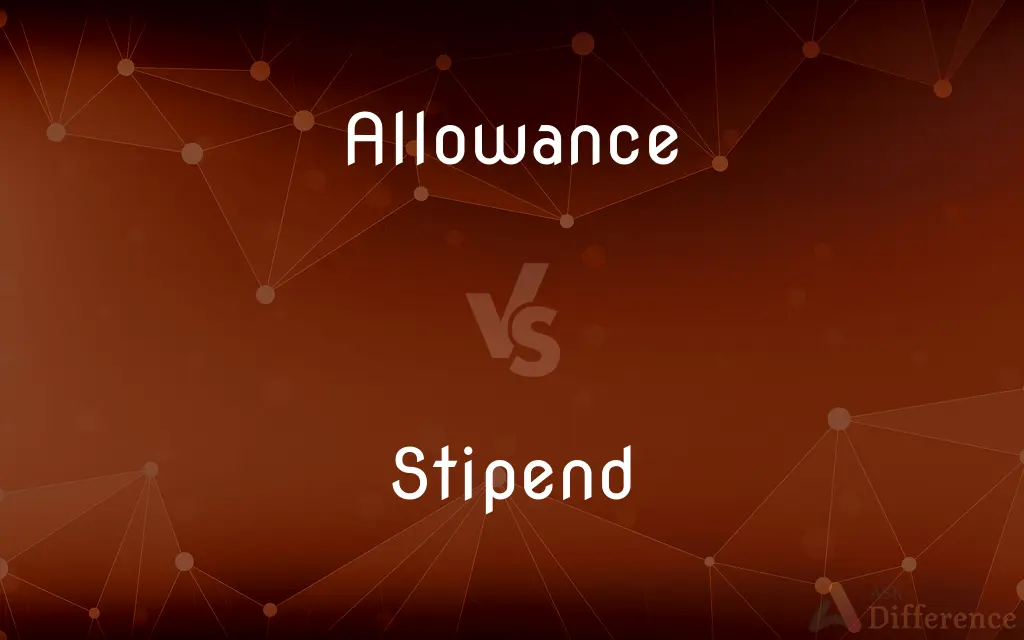Allowance vs. Stipend — What's the Difference?
By Tayyaba Rehman & Maham Liaqat — Updated on March 31, 2024
Allowance refers to a fixed sum given regularly for a specific purpose, while a stipend is a payment made to support a person's living expenses, often associated with educational or internship programs.

Difference Between Allowance and Stipend
Table of Contents
ADVERTISEMENT
Key Differences
An allowance is typically a sum of money given regularly by parents to their children or by employers to cover specific expenses. It's often intended to teach financial responsibility or to cover minor personal expenses. On the other hand, a stipend is a form of payment made to individuals, such as interns or trainees, to support them during unpaid internships or volunteer positions. Stipends are not considered wages as they are usually lower and meant to help with living expenses during a period of learning or professional development.
Allowances are often given with no expectation of the recipient performing any specific tasks or duties in return. This makes allowances more of a financial support or benefit. Stipends, whereas, are usually associated with some form of work or contribution, even if not fully compensated like a traditional salary. This distinction underscores the expectation that the stipend receiver is gaining experience or education rather than earning in a conventional sense.
The amount of an allowance can vary greatly depending on the giver's intent and the recipient's needs or expectations. It might be set to cover specific costs, like commuting or meals, or given as a lump sum for broader use. Stipends, on the other hand, are often predetermined by the sponsoring organization and aim to cover basic living expenses, reflecting a more uniform approach based on the typical needs of the recipient during their engagement period.
The periodicity of payment can also differ; allowances may be given out on a more flexible basis, adjusted as needs or circumstances change. Stipends are typically paid out at regular intervals, such as monthly, for the duration of the program or assignment, indicating a structured financial support system.
The tax implications of allowances and stipends can vary based on local laws and the specifics of the payment. Allowances given by parents to their children are usually not taxable, while those provided by employers might be, depending on their purpose and amount. Stipends may or may not be taxable, often depending on whether they are considered a form of wage or compensation for services rendered.
ADVERTISEMENT
Comparison Chart
Definition
A fixed sum given regularly for a specific purpose, often to cover minor personal expenses.
A payment made to support a person’s living expenses, typically during educational or training programs.
Purpose
To teach financial responsibility, cover specific expenses, or provide financial support.
To support living expenses during internships, volunteering, or educational programs without traditional wages.
Expectation of Work
None. Given without expectation of the recipient performing tasks.
Often associated with work, contribution, or learning in a professional or educational setting.
Amount and Variability
Can vary based on giver's intent and recipient's needs; may cover specific or general expenses.
Usually predetermined and aimed at covering basic living expenses; reflects a standard based on typical needs.
Compare with Definitions
Allowance
A sum of money given regularly for a specific purpose.
My parents give me a weekly allowance for my lunches.
Stipend
A subsidy for professional development.
The fellowship includes a stipend to attend international conferences.
Allowance
A teaching tool for financial responsibility.
Giving children an allowance can teach them about saving and budgeting.
Stipend
A non-wage compensation for services.
Volunteers in the program receive a stipend as a token of appreciation.
Allowance
A benefit or provision by an employer.
Employees receive a yearly allowance for professional development.
Stipend
Financial support for interns or students.
Graduate students often receive a stipend for their research work.
Allowance
Financial support provided to cover specific expenses.
The company offers a travel allowance for business trips.
Stipend
A fixed, regular payment to support living expenses during educational or training programs.
The internship offers a monthly stipend to cover transportation and meals.
Allowance
A budgeting tool for personal expenses.
I use my allowance to manage my spending on entertainment.
Stipend
A support mechanism for unpaid internships.
The organization provides a stipend to ensure all interns can afford living expenses.
Allowance
The act of allowing.
Stipend
A stipend is a regular fixed sum of money paid for services or to defray expenses, such as for scholarship, internship, or apprenticeship. It is often distinct from an income or a salary because it does not necessarily represent payment for work performed; instead it represents a payment that enables somebody to be exempt partly or wholly from waged or salaried employment in order to undertake a role that is normally unpaid or voluntary, or which cannot be measured in terms of a task (e.g.
Allowance
An amount that is allowed or granted
Consumed my weekly allowance of two eggs.
Stipend
A fixed and regular payment, such as a salary for services rendered or an allowance.
Allowance
Something, such as money, given at regular intervals or for a specific purpose
A travel allowance that covers hotel bills.
Stipend
(archaic) A regular fixed payment made to someone (especially a clergyman, judge, soldier, or teacher) for services provided by them; a salary. 15
Allowance
A small amount of money regularly given to a child, often as payment for household chores.
Stipend
(by extension)
Allowance
A price reduction, especially one granted in exchange for used merchandise
The dealer gave us an allowance on our old car.
Stipend
Some other form of fixed (and generally small) payment occurring at regular intervals, such as an allowance, a pension, or (obsolete) a tax. 16
Pocket money
My stipend for doing public service is barely enough to cover living expenses.
Allowance
To put on a fixed allowance
Cut expenses by strictly allowancing the sales representatives.
Stipend
(education) A scholarship granted to a student. 20
Allowance
To dispense in fixed quantities; ration.
Stipend
(obsolete)
Allowance
Permission; granting, conceding, or admitting
Stipend
Money which is earned; an income.
Allowance
Acknowledgment.
Stipend
A one-off payment for a service provided.
Allowance
An amount, portion, or share that is allotted or granted; a sum granted as a reimbursement, a bounty, or as appropriate for any purpose
Her meagre allowance of food or drink
Being a volunteer is unpaid, but we get accommodation and a living allowance of 100 euros a week.
Stipend
To provide (someone) with a stipend (an allowance, a pension, a salary, etc.). 16
Allowance
Abatement; deduction; the taking into account of mitigating circumstances
To make allowance for his naivety
Stipend
Settled pay or compensation for services, whether paid daily, monthly, or annually.
Allowance
(commerce) A customary deduction from the gross weight of goods, differing by country.
Tare and tret are examples of allowance.
Stipend
To pay by settled wages.
Allowance
(horse racing) A permitted reduction in the weight that a racehorse must carry.
On the Flat, an apprentice jockey starts with an allowance of 7 lb.
Stipend
A sum of money allotted on a regular basis; usually for some specific purpose
Allowance
A child's allowance; pocket money.
She gives her daughters each an allowance of thirty dollars a month.
Allowance
(minting) A permissible deviation in the fineness and weight of coins, owing to the difficulty in securing exact conformity to the standard prescribed by law.
Allowance
(obsolete) Approval; approbation.
Allowance
(obsolete) License; indulgence.
Allowance
(engineering) A planned deviation between an exact dimension and a nominal or theoretical dimension.
Allowance
(transitive) To put upon a fixed allowance (especially of provisions and drink).
The captain was obliged to allowance his crew.
Allowance
(transitive) To supply in a fixed and limited quantity.
Our provisions were allowanced.
Allowance
Approval; approbation.
Allowance
The act of allowing, granting, conceding, or admitting; authorization; permission; sanction; tolerance.
Without the king's will or the state's allowance.
Allowance
Acknowledgment.
The censure of the which one must in your allowance o'erweigh a whole theater of others.
Allowance
License; indulgence.
Allowance
That which is allowed; a share or portion allotted or granted; a sum granted as a reimbursement, a bounty, or as appropriate for any purpose; a stated quantity, as of food or drink; hence, a limited quantity of meat and drink, when provisions fall short.
I can give the boy a handsome allowance.
Allowance
Abatement; deduction; the taking into account of mitigating circumstances; as, to make allowance for the inexperience of youth.
After making the largest allowance for fraud.
Allowance
A customary deduction from the gross weight of goods, different in different countries, such as tare and tret.
Allowance
To put upon a fixed allowance (esp. of provisions and drink); to supply in a fixed and limited quantity; as, the captain was obliged to allowance his crew; our provisions were allowanced.
Allowance
An amount allowed or granted (as during a given period);
Travel allowance
My weekly allowance of two eggs
A child's allowance should not be too generous
Allowance
A sum granted as reimbursement for expenses
Allowance
An amount added or deducted on the basis of qualifying circumstances;
An allowance for profit
Allowance
A permissible difference; allowing some freedom to move within limits
Allowance
A reserve fund created by a charge against profits in order to provide for changes in the value of a company's assets
Allowance
The act of allowing;
He objected to the allowance of smoking in the diningroom
Allowance
Put on a fixed allowance, as of food
Common Curiosities
What is a stipend?
A stipend is a payment intended to support someone’s living expenses, especially during internships or educational programs.
Is an allowance taxable?
It depends on the source and purpose; allowances from parents are not taxable, but those from employers might be.
Who typically receives a stipend?
Interns, trainees, or students involved in programs that do not offer wages.
Are stipends considered wages?
No, stipends are not considered wages as they are meant to support living expenses, not compensate for work performed.
What is an allowance?
An allowance is a fixed sum of money given regularly for a specific purpose, often to help cover personal expenses.
Why are stipends offered?
To support individuals during periods of unpaid work or study, allowing them to focus on learning and professional development.
Is a stipend taxable?
Taxability varies by jurisdiction and the nature of the stipend; some are taxable, while others are not.
Can an allowance be used for any purpose?
Yes, although it may be intended for specific expenses, the recipient can often use it as they see fit.
How is the amount of a stipend determined?
By the sponsoring organization, based on standard living expenses during the program.
Who typically receives an allowance?
Children from their parents, or employees from employers for specific expenses.
Do stipends need to be repaid?
No, stipends are also given without expectation of repayment.
How is the amount of an allowance determined?
By the giver, based on the recipient's needs, expectations, or specific expenses to be covered.
Do allowances need to be repaid?
No, allowances are given without expectation of repayment.
Can both allowances and stipends vary in amount?
Yes, but allowances tend to vary more based on individual circumstances, while stipends follow a more standard approach.
Can allowances teach financial responsibility?
Yes, especially when given to children as a tool for learning to budget and save.
Share Your Discovery

Previous Comparison
Bubblegum vs. Gum
Next Comparison
Mortar vs. ScreedAuthor Spotlight
Written by
Tayyaba RehmanTayyaba Rehman is a distinguished writer, currently serving as a primary contributor to askdifference.com. As a researcher in semantics and etymology, Tayyaba's passion for the complexity of languages and their distinctions has found a perfect home on the platform. Tayyaba delves into the intricacies of language, distinguishing between commonly confused words and phrases, thereby providing clarity for readers worldwide.
Co-written by
Maham Liaqat














































